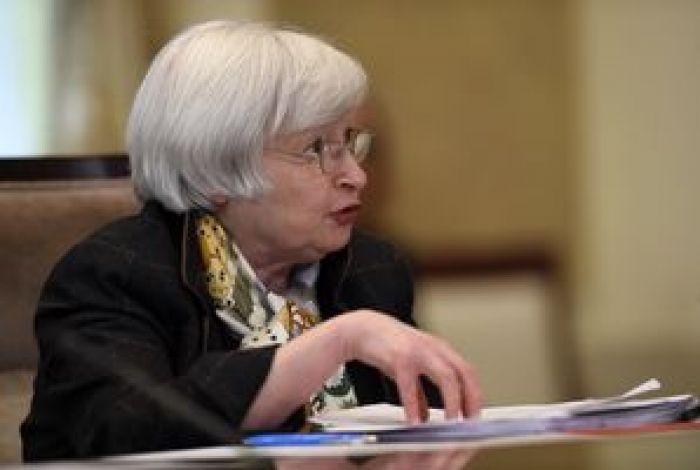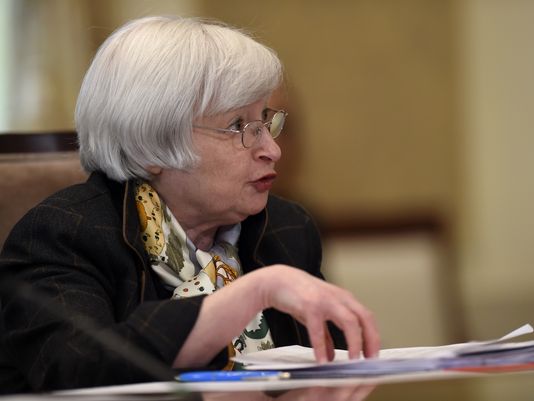Fed tea leaves: Rate hike coming midyear?


Federal Reserve Chair Janet Yellen has said she expects inflation to pick up as oil price declines moderate.(Photo: Susan Walsh, AP)
The Federal Reserve this week is expected to stand by tentative plans to raise interest rates this year despite recent action by its European counterpart that's likely to further hold down U.S. inflation.
"I think they're in wait-and-see mode, and they're still sticking to their mid-2015 guidance," says Michael Gapen, chief U.S. economist of Barclays Capital and former head of a Fed monetary policy division.
Investors will be scouring the Fed's post-meeting statement for any signals of a possible delay in the Fed's timetable.
The Fed, which concludes its two-day meeting Wednesday, is looking to raise its benchmark short-term interest rate from near zero for the first time since the 2008 financial crisis amid an accelerating U.S. economy. But it's hesitant to move too quickly because tumbling oil prices and a strong dollar are keeping annual inflation unusually low, at about 1%.
Low inflation can lead to falling wages and prices, or deflation, which can prompt consumers to put off purchases and weaken the economy.
The downward pressure on inflation was amplified last week by the European Central Bank's decision to buy 1.1 trillion euros ($1.3 trillion) in bonds by fall 2016 to contain already low interest rates and pump cash into the eurozone's anemic economy.
The move further drove down the historically low euro against the dollar, making European imports cheaper for U.S. consumers and raising the specter of even lower U.S. inflation.
In a speech earlier this month, Atlanta Fed President Dennis Lockhart, who's considered a moderate on the Fed's policymaking committee, said, "If the early months of this year bring mixed news on the economy, the risk manager in me will lean to preferring a later date" for the first rate increase.
Fed Chair Janet Yellen has said she thinks the meager inflation is temporary and largely reflects the sharp fall in oil and gasoline prices. She and other Fed policymakers have said core prices, which exclude volatile food and energy costs, should drift toward the Fed's annual 2% target this year.
The Fed typically raises interest rates to keep inflation from spiraling too high as the economy and labor market heat up and lowers rates to spur growth. The unemployment rate has fallen from 6.7% to a near-normal 5.6% over the past year, providing support for adhering to Fed policymakers' forecast for the first rate hike in June.
Gapen says he expects the Fed on Wednesday to reiterate the assertion in its December post-meeting statement that it "can be patient" as it considers when to raise rates. Yellen told reporters that means the first increase won't happen for at least two meetings, or before April.
Gapen says the move could be delayed if core inflation drops unexpectedly over the next couple of months.
But policymakers are likely to remove a reference to rates remaining near zero "for a considerable time" after the end of a bond-buying stimulus that was halted in October, economists say.
Morgan Stanley cited a small chance that Fed policymakers on Wednesday will "acknowledge greater downside risks" to the inflation outlook. Investors likely would react by further driving down market-based interest rates on expectations of a later Fed rate increase.
Another variable this month is the annual turnover among regional Fed bank presidents who vote on the Fed's policymaking committee. Among those losing their votes are two anti-inflation stalwarts, or "hawks," who have called for an earlier rate hike, Philadelphia Fed President Charles Plosser and Dallas Fed chief Richard Fisher. Another dropping out is a pro-growth advocate, or "dove," Minnesota Fed chief Narayana Kocherlakota.
Among those joining the voters are dovish Chicago Fed President Charles Evans, and hawkish Richmond Fed chief Jeffrey Lacker.
On balance, the changes could lend the 12 voting members "a slight dovish tilt," says Tim Duy, author of the Fed Watch blog and a University of Oregon economics professor. But he said that probably won't "change the likely path of (Fed) policy."
Read or Share this story: http://usat.ly/1CbnqaL









